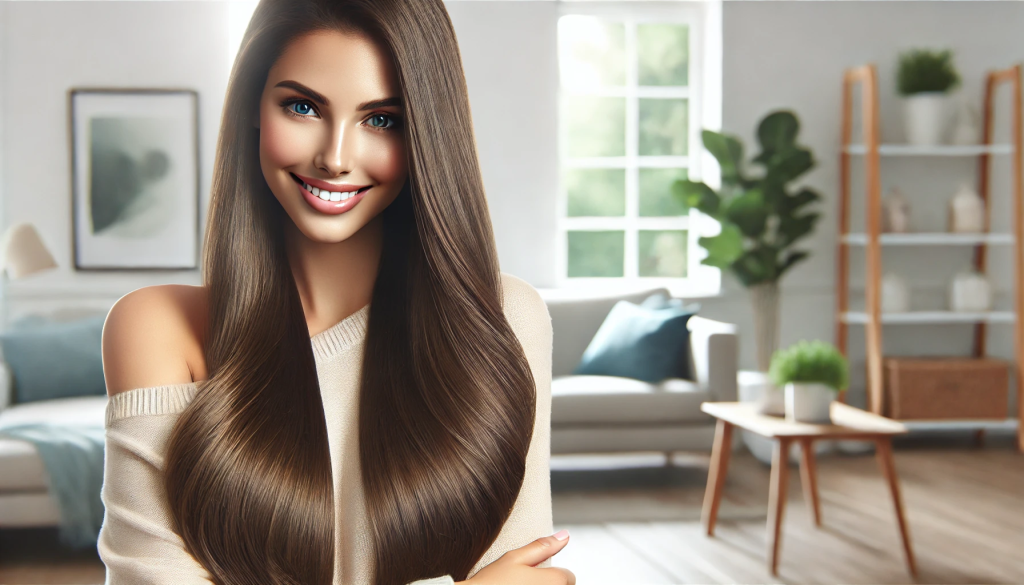Healthy, shiny hair is not just an aesthetic asset but also an indicator of overall health. Hair deterioration can result from vitamin deficiencies, stress, improper care, and other factors. This article details how to improve hair health using natural and accessible methods.
1. Healthy Diet for Hair
Proper nutrition plays a vital role in maintaining hair health. Incorporate foods rich in:

- Omega-3 fatty acids, found in salmon, walnuts, and flaxseeds, to prevent scalp dryness and strengthen hair roots.
- Biotin, also known as the beauty vitamin, which promotes healthy hair growth. Sources include eggs, nuts, and spinach.
- Vitamin E, present in avocado and vegetable oils, which protects hair from damage and improves texture.
- Vitamin D, which stimulates hair follicles. Get it from fish, mushrooms, and dairy products.
Ensure your diet is diverse and includes fruits and vegetables. A deficiency in these nutrients can lead to dry, brittle hair and slow growth.
2. Regular Moisturizing
One of the most common causes of poor hair condition is dryness. To moisturize your hair:
- Use natural oils such as coconut, argan, or shea butter, which deeply nourish hair.
- Apply masks containing aloe vera, known for its hydrating and restorative properties.
- Use moisturizing conditioners after every wash. This helps seal hair cuticles, leaving them smooth and shiny.
Regular moisturizing is especially important during winter when indoor heating dries the air.
3. Proper Scalp Cleansing
Maintaining a clean scalp is essential for healthy hair. Use:
- Gentle shampoos free of sulfates and silicones to prevent scalp dryness.
- Regular scalp exfoliation with scrubs or exfoliating shampoos to remove dead skin cells and improve circulation.
Avoid frequent washing, which can strip your scalp of natural oils. Aim to wash your hair 2–3 times per week.
4. Minimizing Heat Exposure
Frequent use of curling irons, straighteners, and blow dryers can damage hair structure. To reduce harm:
- Always apply heat protectant sprays before styling.
- Let your hair air dry whenever possible. If not, use a blow dryer on a low heat setting.
- Limit hot tool usage to 1–2 times per week.
Reducing heat exposure keeps hair strong and less prone to breakage.
5. Scalp Massage

Massaging your scalp stimulates blood circulation, promoting healthy hair growth. For best results:
- Use your fingertips to massage in circular motions.
- Add a few drops of essential oils like rosemary or lavender for enhanced effects.
- Spend 5–10 minutes daily on scalp massage.
This not only improves hair condition but also helps you relax and relieve stress.
6. Avoid Stress
Stress is one of the leading causes of hair loss. Elevated cortisol levels can weaken hair follicles. To manage stress:
- Practice meditation, deep breathing, or yoga.
- Engage in regular physical activity such as running or walking.
- Prioritize adequate sleep, as lack of rest worsens overall health and hair quality.
Managing stress not only benefits your hair but also promotes overall well-being.
7. Regular Trimming
Split ends make hair look unhealthy and hinder growth. Regular trimming:
- Keeps hair strong and healthy.
- Reduces breakage and prevents further splitting.
- Gives hair a more polished and neat appearance.
Trim your hair every 6–8 weeks to maintain its health.
8. Using Natural Remedies

Natural hair masks are an excellent way to nourish and restore hair. Try:
- Egg-based masks, which are rich in protein and nourish hair.
- Honey masks, which hydrate and add shine.
- Banana masks, which feed hair with potassium.
Regular use of natural remedies helps repair damaged hair and improve its texture.
9. Protecting Against Environmental Factors
Environmental elements can negatively affect hair health. To protect your hair:
- Use hair products with SPF for sun protection.
- Wear hats or scarves on sunny days.
- In colder seasons, shield your hair from low temperatures and wind.
These measures prevent hair from drying out and maintain its shine.
10. Controlling Moisture Levels
Excess humidity can make hair frizzy, while dry climates can make it brittle. To address these issues:
- Use indoor humidifiers to maintain air moisture.
- Apply anti-static sprays to prevent frizz.
- Use leave-in conditioners to lock in moisture.
Maintaining optimal moisture levels makes hair more manageable and healthy.
11. Physical Activity and Hair

Regular physical activity improves blood circulation, including to the scalp. This stimulates hair follicles and enhances hair condition. Moderate exercise such as running, swimming, or yoga benefits the entire body and strengthens hair.
12. Hormonal Balance
Hair condition is often linked to hormonal health. Hormonal imbalances, such as increased testosterone or decreased estrogen levels, can cause hair loss. If you notice significant hair deterioration, consult a doctor to assess your hormonal levels.
Conclusion
Improving hair health requires a comprehensive approach. A healthy diet, proper care, protection from environmental factors, and stress management are key aspects of maintaining strong, shiny hair. Follow these tips to ensure your hair always looks its best.

















Pingback: 10 Surprising Benefits of Fish Oil for Women—Improve Your Health Today! - Medhouse.info